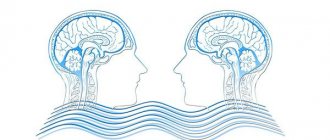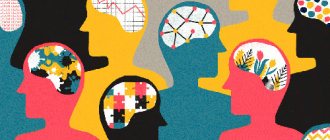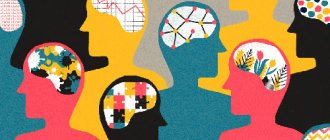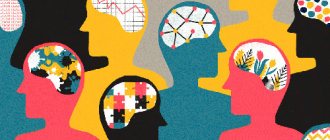Mental health. What does his well-being depend on, and how to preserve it?
- Seal
construction of house walls buy Chinese phones in Ukraine
Mental health is an integral part and essential component of health. The WHO Constitution states: “Health is a state of complete physical, mental and social well-being and not merely the absence of disease or infirmity.” An important implication of this definition is that mental health is not only the absence of mental disorders and disabilities.
Mental health is a state of well-being in which a person realizes his or her abilities, can cope with the normal stresses of life, work productively, and contribute to their community. In this positive sense, mental health is fundamental to individual well-being and the effective functioning of communities.
Let us define the criteria for mental health:
Criticism of oneself and one’s own mental production (activity) and its results.
This criterion can be designated as the ability for introspection and introspection, for reflection. The ability to evaluate what a person says and does and evaluate the consequences of those words and deeds.
For example, “I know that I am a hypochondriac (a person extremely fixated on the sensations of his own body, looking for diseases in himself) and for any reason it is easier for me to go to the doctor than to self-soothe. I don't believe in psychotherapy, although I know that I am physically healthy. I am ready to pay for consultations and tests, and these people in white coats with attentive eyes are my most effective psychotherapy. And this is the price of my hypochondria.”
Mental health care and treatment
In the context of national efforts to develop and implement mental health policies, it is critical not only to protect and promote the mental well-being of citizens, but also to address the needs of persons with specific mental disorders.
Over the past decade, understanding of what needs to be done to address the growing burden of mental disorders has improved significantly. There is growing evidence that key interventions for priority mental disorders are effective and cost-effective in countries at different levels of economic development. Examples of such actions that are cost effective, feasible and affordable include:
- treating depression with psychotherapy and, in cases of moderate or severe depression, antidepressants;
- treatment of psychosis with antipsychotic drugs in combination with psychosocial support;
- taxation of alcoholic beverages and restrictions on their sale and advertising.
In addition, there are a number of effective interventions for suicide prevention, prevention and treatment of mental disorders in children, prevention and treatment of dementia, and treatment of substance use disorders. The WHO Mental Health Gap Action Program (mhGAP) has developed evidence-based guidelines for lay people to identify and manage a range of priority mental health disorders.
The ability to change behavior depending on changing life situations and circumstances.
Although last on the list, it is one of the most obvious criteria for mental health. The ability to be adaptive, to have flexibility of thinking and behavior are important functions of a healthy human psyche.
Next, consider the signs of mental health according to Nancy McWilliams
1. The ability to love. The ability to engage in relationships, to open up to another person. Love him as he is: with all his shortcomings and advantages. Without idealization and devaluation. It is the ability to give rather than take.
2. Ability to work. This applies not only to the profession. It is primarily about the ability to create and create. It is important for people to realize that what they do has meaning and meaning for Others. This is the ability to bring something new into the world, creativity.
3. Ability to play. Here we are talking about both the literal sense of “play” in children and the ability of adults to “play” with words and symbols. This is an opportunity to use metaphors, allegories, humor, symbolize your experience and enjoy it.
4. Safe relationships. Unfortunately, often people who seek psychotherapy are in violent, threatening, dependent relationships - in a word, unhealthy relationships.5. Autonomy. People who turn to psychotherapy often have a lack of it (but huge potential, since they finally came to therapy). People don't do what they really want. They don’t even have time to “choose” (listen to themselves) what they want.6. Constancy of self and object or the concept of integration. This is the ability to remain in touch with all aspects of one's self: both good and bad, both pleasant and not causing intense joy. It is also the ability to feel conflicts without being split. This is the contact between the child I was, the person I am now, and the person I will be in 10 years. This is the ability to take into account and integrate everything that is given by nature and what I have managed to develop in myself. One of the violations of this point may be an “attack” on one’s own body, when it is not unconsciously perceived as part of oneself. It becomes something separate that can be forced to starve or cut, etc.
7. The ability to recover from stress (Ego strength). If a person has enough ego strength, then when he encounters stress, he does not get sick, does not use only one inflexible defense to get out of it, and does not break down. He is able to adapt to a new situation in the best possible way.
8. Realistic and reliable self-esteem
9. System of value orientations. It is important that a person understands ethical standards, their meaning, and at the same time be flexible in following them.
10. The ability to endure intense emotions. Tolerating emotions means being able to stay with them, feel them, without acting under their influence. It is also the simultaneous ability to remain in touch with both emotions and thoughts - the rational part of oneself.11. Reflection is the ability to look at oneself as if from the outside. People with reflection are able to see what exactly their problem is and, accordingly, deal with it in such a way as to solve it, helping themselves as effectively as possible.
12. Mentalization - having this ability, people are able to understand that Others are completely separate individuals, with their own characteristics, personal and psychological structure. Such people also see the difference between feeling offended by someone's words and the fact that the other person did not really mean to offend them.
13. Wide variety of protective mechanisms and flexibility in their use.14. The balance between what I do for myself and for my environment. This is about the opportunity to be yourself and take care of your own interests, while taking into account the interests of the partner with whom you have a relationship.
15. Sense of vitality - the ability to be and feel alive.
16. Acceptance of what we cannot change. This is about the ability to be sincerely and honestly sad, to experience grief over what cannot be changed. Accepting our limitations and mourning what we wish we had but don't have.
Thus, mental health is an integral part of the health of the body as a whole. The normal level of mental health is understood as the harmonious development of the psyche, corresponding to the age and age norm of a particular person.
A favorable functional state is characterized by many factors. Thus, one of the leading indicators of the functional state of the psyche is mental performance, which integrates the main characteristics of the psyche - perception, attention, memory, etc.
High mental performance is one of the main indicators of mental health and an important indicator of the favorable functional state of the body as a whole.
Positive thinking
Any situation in life can be assessed differently: someone is critical of everything and notices shortcomings even in the most pleasant event, while someone, on the contrary, tries to paint what is happening in cheerful colors and finds positivity in the most difficult situation. The ability to easily and humorously experience all the problems that arise will help you maintain your mental health and protect you from the negative effects of stress and anxiety. You will learn to look for positive moments in any situation, treat what happened as a life lesson, and not as a mistake or bad luck, extract experience and new opportunities from what is happening, and not become discouraged and depressed when obstacles and difficulties arise.
Based on materials from the sites: https://4brain.ru, https://medportal.ru
Dentist-therapist Samsonova E.V.
Move more and play sports
Movement is life. A person is, first of all, a body that needs physical activity both for survival and for intellectual activity. The areas of the brain that are responsible for intelligence are closely connected with those that are responsible for physical activity in the sensorimotor cortex. And the development of our intellectual abilities is associated precisely with physical activity.
To feel good and not have problems sleeping, you need to develop a routine.
But physical activity is different, and it is absolutely not necessary to exhaust yourself with training and build up piles of muscles. It is best to walk more and use transport less. And if you really want to work out in the gym, you need to do it carefully, according to an individual program and under the supervision of a trainer.
Be grateful for what you have
We very quickly get used to everything good, and we stop noticing that we have it. At the same time, we begin to complain that we don’t have something, lament that we lack something. When we say gratitude to someone or for something, it always evokes positive emotions, makes us happy and reduces stress levels. When we don't notice the good around us, we become immersed in negativity and painful emotions. Pay attention to all the good things that happen to you and you will feel much better.
Don't forget about live communication
Live communication allows you to receive much more signals and information that people need to fully perceive each other. No virtual channel conveys to us the smallest details, micro-movements in the voice, facial expressions and other important details in communication. It is full-fledged live communication that enriches us mentally and to a greater extent allows us to record positive moments in relationships. Make personal appointments with friends and family as often as possible, especially if it’s easier for you to stay at home and not go out. It is very important not to close yourself off from the world and live communication and purposefully build personal interaction with others.
Get enough sleep
Healthy sleep is vital for a person. With sleep disorders, for example, insomnia, breathing problems may occur and the brain is poorly enriched with oxygen. If a person sleeps shallowly, he does not get enough sleep phases, and as a result, he may suffer from lack of sleep and constantly feel tired. When treating mental illnesses such as depression and anxiety, sometimes it is enough to build a normal lifestyle and normalize sleep. It is enough to establish the most important physiological functions of a person, and everything changes.
To feel good and not have problems sleeping, you need to develop a routine. It is advisable to get up before 8 o'clock in the morning, but not earlier than 7. If you still need to get up at 6 because of work or other matters, then it is advisable to go to bed no later than 22:00. You need to wake up gradually, give yourself time to recover from sleep, lie in bed for a while, and then calmly get dressed and start your business so that the day does not seem crumpled. Ideally, you should adhere to your personal biological rhythm of waking up and get up when you feel comfortable.
- Diseases and disorders
Spend more time in nature
Breathing fresh air is very beneficial for efficient brain function. No matter how many plants you have at home, it is important to go outside from time to time, and best of all, go out into nature. No environment inside the house can visually, auditorily or kinesthetically replace what the forest, mountains and fields give us. We live too little time in developing cities, but we spent many millennia in nature for our civilization to be able to change what is inherent in us evolutionarily. When we move away from nature, we do not get enough visual contrasts, noises, smells, tactile sensations that we would like to receive in our cozy homes. Our homes may be state-of-the-art and comfortable, but nothing man-made can replace time spent outdoors.
Use less social media
We often overdo our time on social media and it takes a toll on our mental health. More and more people prefer virtual communication to real communication and spend all their free time on gadgets. Try deleting social networks from your smartphone and viewing them only on your computer. You will feel how much free time you have for other things and relaxation. You can also turn on silent notification mode when you are doing work tasks or spending time with loved ones. Try to let social networks distract you from real life and real impressions as little as possible.








